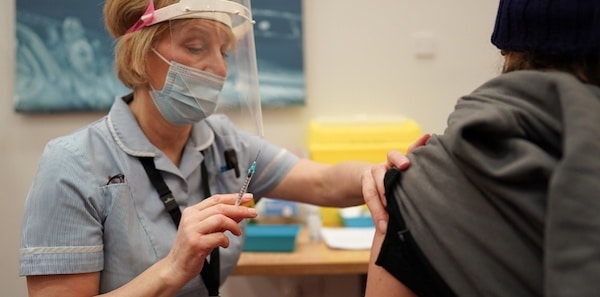THE NHS is facing its biggest ever crisis, medical professionals and unions warned today, with hospitals at risk of being swamped by coronavirus admissions.
England’s chief medical officer Chris Whitty said that the NHS was facing its “most dangerous situation” in living memory.
Tory cuts have left the NHS short of about 80,000 staff–including 40,000 nurses–and staffing levels are worsening as nurses, doctors and ancillary staff succumb to the virus.
The British Medical Association (BMA) said that over 46,000 NHS staff are now off work after contracting the virus–a situation which places even more strain on those still able to work.
Hospital admissions are much higher than they were at the peak of the first wave of the virus in April last year.
Professor Whitty said:
The NHS in some parts of the country is currently facing the most dangerous situation anyone can remember.
If the virus continues on this trajectory, hospitals will be in real difficulties, and soon.
Staff-to-patient ratios–already stretched–will become unacceptable even in intensive care.
Unison head of health Sara Gorton, who is also the chairwoman of the NHS group of 14 unions representing 1.3 million staff, said:
The NHS is facing the worst crisis in its history.
Everyone is relying on health workers in many different roles to see us through. Clapping has been a way of showing support, but the government now needs to pay up.
Ambulances carrying patients have been forced to queue outside hospitals for up to nine hours because no beds are available, the College of Paramedics has reported.
Chief executive Tracy Nicholls said that the lengthy delays in transferring patients from ambulances to hospitals were causing delays of up to 10 hours in responding to 999 calls in some areas.
“We are seeing the ambulance handover delays at a scale we haven’t seen before,” she said.
We are very used to seeing ambulance services take some strain over the winter months due to the normal pressures we would see any particular year.
But this year particularly has seen incredible pressure because of the clinical presentation of the patients our members are seeing. They are sicker.
The ambulance service is under unprecedented pressure.
The number of coronavirus patients in hospital in England stood at a record 29,346 as of 8am on Friday, up by 30 per cent from a week ago, while admissions have also hit a new high, according to the latest NHS England figures.
And the number of recorded coronavirus deaths passed 80,000 on Saturday–but there could be worse to come, health specialists warned.
University College London professor of health psychology Susan Michie, a participant in both the Sage and Independent Sage advisory groups, said that unless the government brings the virus under control, there was a danger of “tens of thousands of avoidable deaths over the next few weeks.”
BMA consultants committee deputy chairman Dr Simon Walsh said:
I’m afraid all of us who are working on the frontline believe–and this is based on the evidence I’m afraid–that it is going to get worse before it gets better.
The crisis in Britain stands in stark contrast to many other countries, whose swift action in March last year halted the spread the virus.
In New Zealand just 25 people have died of the disease and only 2,219 have been infected, in a situation managed with strict border controls and a nationwide lockdown on March 25–one of the earliest in the world.
The 14 unions representing 1.3 million NHS staff are demanding that all health and social care workers be given a “decent pay rise.”
But the government insists that, despite the staff’s efforts, there will be no NHS pay rise until current contracts run out in April.

